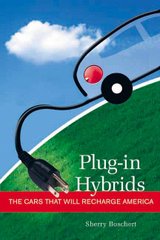The opening line of the
Detroit News story says all you need to know:
The House approved a stripped-down energy bill Tuesday and sent it to President George Bush, who is expected to sign the legislation.
The headline is a 35mpg CAFE standard for cars produced 13 years from now. Big whoop.
The best stuff in the bill is energy efficiency standards, including phasing out the incandescent light bulb.
The reality, however, is no removal of tax breaks for Big Oil; no 15% renewables standard for utilities; no plug-in hybrid incentives.
Incentives for wind and solar were stripped out, as well, according to Sen. Boxer. "We're pretty disappointed," said Rhone A. Resch, president of the Solar Energy Industries Association, which sought an extension of the investment tax credit that expires at the end of next year.
But yes, there is a requirement for five times more ethanol than we now produce. "Clean tech" will have a place to throw some money, even if the environmental benefit is nil, the impact on petroleum usage minor, the impact on food prices unknown. As stated in the
Washington Post story today, "For farmers and agribusiness, it is a windfall, providing more support than perhaps even the farm bill." 'Nuf said.
Why Nancy Pelosi calls the bill "a moment of change, of real change" is not yet clear. Most elements that would constitute a progressive energy bill have been dropped out.
I can't help thinking if carmakers are still producing masses of 20something mpg cars and pickups and SUVs in 2020, something envisioned with a 35mpg
average, we're in big trouble
. Honestly, though, I think this standard will be overtaken by reality. Once a few plug-in hybrids and electric cars hit the market, and they will long before 2020, the relevance of these standards will disappear in the rearview mirror of reality.
Or you can read someone snarkier and more cyncial about these matters than I,
Mark Morford the San Francisco Chronicle columnist.
...because it's Beltway politics and watching it too closely is akin to having your cerebral cortex raped by encephalitic trolls, I've only paid cursory attention to the massive, landmark energy bill that's right now passing like a painful gallstone through Congress and getting snagged here and gutted there and stripped of key provisions over here, all so Dubya won't veto it, given how it might be just too mean to his fat, piggish pals in Big Energy.









